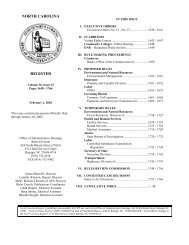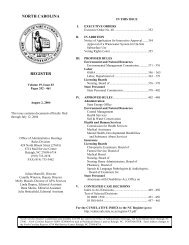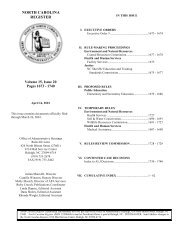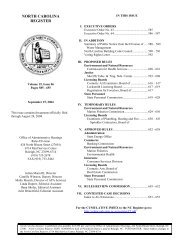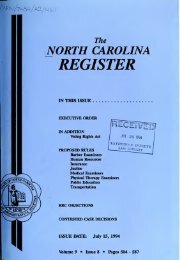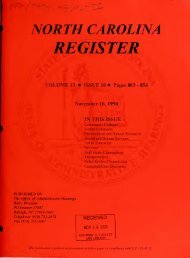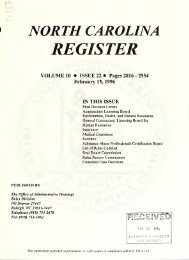NC Register Volume 23 Issue 09 - Office of Administrative Hearings
NC Register Volume 23 Issue 09 - Office of Administrative Hearings
NC Register Volume 23 Issue 09 - Office of Administrative Hearings
You also want an ePaper? Increase the reach of your titles
YUMPU automatically turns print PDFs into web optimized ePapers that Google loves.
PROPOSED RULES<br />
exact location <strong>of</strong> each container or storage tank <strong>of</strong>f the premises<br />
<strong>of</strong> the formulator at least 15 days prior to the beginning <strong>of</strong> filling<br />
operations. An inspector <strong>of</strong> the North Carolina Department <strong>of</strong><br />
Agriculture will by appointment with the owner inspect each<br />
container or storage tank within the aforementioned 15-day<br />
period. Any container or storage tank utilized for housing bulk<br />
pesticides prior to inspection and approval constitutes a violation<br />
<strong>of</strong> the North Carolina Pesticide Law <strong>of</strong> 1971.<br />
Authority G.S. 143-441; 143-466.<br />
02 <strong>NC</strong>AC <strong>09</strong>L .08<strong>09</strong> COMPLIA<strong>NC</strong>E<br />
REQUIREMENTS<br />
The owner <strong>of</strong> the container or storage tank shall be responsible<br />
for complying with all provisions <strong>of</strong> this article not otherwise<br />
specified.<br />
Authority G.S. 143-434 through 143-470.<br />
02 <strong>NC</strong>AC <strong>09</strong>L .0810 ADOPTION BY REFERE<strong>NC</strong>E<br />
The North Carolina Pesticide Board hereby adopts by reference,<br />
including subsequent amendments, Part 165 <strong>of</strong> Title 40:<br />
Protection <strong>of</strong> Environment <strong>of</strong> the Code <strong>of</strong> Federal Regulations,<br />
entitled "Pesticide Management and Disposal Subpart E –<br />
Standards for Pesticide Containment Structures." Copies <strong>of</strong> this<br />
material may be obtained at no cost from the U.S. Government<br />
Printing <strong>Office</strong> website, www.gpoaccess.gov/cfr/index.html.<br />
Authority G.S. 143-441; 143-461.<br />
SECTION .1900 - PESTICIDE STORAGE<br />
02 <strong>NC</strong>AC <strong>09</strong>L .1901 DEFINITIONS<br />
All specific words or terms used in this Section other than those<br />
defined in this Rule shall have the same definitions as shown in<br />
the North Carolina Pesticide Law <strong>of</strong> 1971, G.S. 143-460. The<br />
rules contained in this Section shall be deemed to be minimum<br />
for storage.<br />
(1) Storage. The act <strong>of</strong> storing a pesticide or<br />
pesticide container unless the pesticide or<br />
pesticide container is being transported or<br />
used. It does not include:<br />
(a)<br />
pesticide containers which are empty<br />
and triple-rinsed (or equivalent);<br />
(b) pesticides which meet the<br />
requirements <strong>of</strong> a Resource<br />
Conservation and Recovery Act<br />
(RCRA) hazardous waste (40 CFR<br />
261.33) and are in the possession <strong>of</strong> a<br />
person possessing a valid EPA RCRA<br />
identification number as a generator<br />
(40 CFR 261.12) or transporter (40<br />
CFR 263.11) <strong>of</strong> hazardous waste or<br />
who owns or operates a facility for<br />
the treatment, storage, or disposal <strong>of</strong><br />
hazardous waste (40 CFR 264.11);<br />
(2) Commercial Storage. Storage <strong>of</strong> a pesticide by<br />
any person from the time <strong>of</strong> manufacture, prior<br />
to possession by the end user;<br />
(3) Storage Facility. Any property or contiguous<br />
properties under the same ownership used for<br />
commercial storage <strong>of</strong> pesticides. Multiple<br />
storage areas in or on single or contiguous<br />
properties under the same ownership are<br />
considered to be in the same storage facility;<br />
(4) Large Storage Facility. Any storage facility<br />
that stores 10,000 pounds or more <strong>of</strong> restricted<br />
use pesticides at any time;<br />
(5) Storage Area. That portion <strong>of</strong> a storage<br />
facility actually used to store pesticides;<br />
(6) Contingency Plan. "Contingency Plan" shall<br />
be a description <strong>of</strong> a facility's plans and<br />
capabilities to deal with a pesticide emergency<br />
resulting from operational procedures,<br />
accidental releases, fires, or other emergencies.<br />
A contingency plan shall be deemed adequate<br />
by the North Carolina Pesticide Board if in the<br />
opinion <strong>of</strong> the Board such plan presents<br />
reasonable assurances that the facility will be<br />
able to contain or otherwise prevent the release<br />
<strong>of</strong> pesticides, to minimize unreasonable<br />
adverse effects on public health or the<br />
environment.<br />
(7) Bulk Storage. Commercial Storage <strong>of</strong> any<br />
pesticide held in stationary pesticide<br />
containers designed to hold undivided<br />
quantities equal to or greater than 500 gallons<br />
(1,890 liters) <strong>of</strong> liquid pesticide or equal to or<br />
greater than 4,000 pounds (1,818 kilograms) <strong>of</strong><br />
dry pesticide are subject to the regulations in<br />
this subpart unless any <strong>of</strong> the following<br />
conditions exists:<br />
(a) The container is empty, that is, all<br />
pesticide that can be removed by the<br />
methods such as draining, pumping,<br />
or aspirating has been removed<br />
(whether or not he container has been<br />
rinsed or washed).<br />
(b) The container holds only pesticide<br />
rinsates or wash waters, and is<br />
labeled accordingly.<br />
(c) The container holds only pesticides<br />
which would be gaseous when<br />
released at atmospheric temperature<br />
and pressure.<br />
(d) The container is dedicated to nonpesticide<br />
use, and is labeled<br />
accordingly.<br />
Authority G.S. 143-437; 143-441; 143-461; 143-466.<br />
02 <strong>NC</strong>AC <strong>09</strong>L .1914 BULK STORAGE<br />
REQUIREMENTS<br />
(a) Outlets, filler and access ports shall be locked at all times<br />
when not in use. Keys to the outlet, filler and access ports shall<br />
be in the possession <strong>of</strong> the purchaser and authorized employees<br />
only. Locks on ports are not required if bulk tanks are stored<br />
inside a facility utilizing security precautions that prevent<br />
unauthorized access to the bulk pesticide storage area.<br />
<strong>23</strong>:<strong>09</strong> NORTH CAROLINA REGISTER NOVEMBER 3, 2008<br />
736




